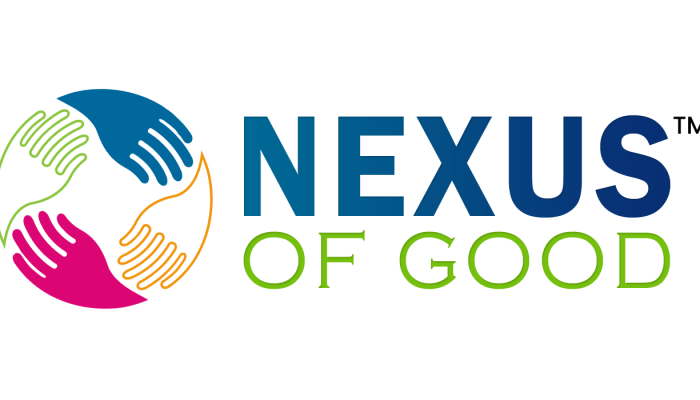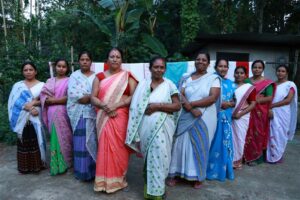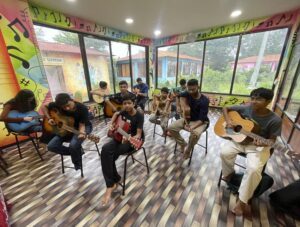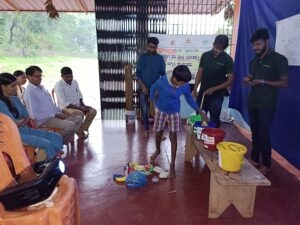Rajat Bansal (IAS: 2012) will shortly complete two years of his stint as Collector Bastar. In a short span of two years, coupled with the misery of the pandemic, revisiting of developmental projects and progressive initiatives in Bastar reflect an unprecedented and unparalleled transformation of the once infamous Naxal heartland. The Bastar development model is unique in its ability to build on strengths and focus on strategic reforms across sectors and capitalize on global development opportunities while retaining its inherent talents.
In response to the need to promote and showcase tribal folk music and dance, regional dialects, and associated literature, BADAL (Bastar Academy of Dance Art and Literature) was launched by District Administration. A brainchild of Mr. Bansal, this initiative aims to conserve and promote tribal art forms, which have been inherited through a chain of tradition by artists. The subjects in focus include various tribal art forms, traditional and indigenous musical instruments, handicrafts, and old arts forms. It is gradually shaping up as a cultural center for youth, additionally providing a platform to delve into fusion art such as rap music in regional languages- Halbi, Bhatri, etc. BADAL has institutionalized the transmission of tribal wisdom from one generation to next. Tribal art forms and languages are part of the academy curriculum. BADAL is led by a Dean under whom are respective Head of Departments for music, dance, language & literature. BADAL has a sprawling 5-acre campus with world-class infrastructure including a library, music recording studio and accommodation for students and out-of-station artists.
Furthermore, BADAL has signed an MOU to affiliate with Indira Kala Sangeet Vishwavidyalaya in Khairagarh to provide degrees and diplomas in folk music and folk dance. For the first time, a formal platform has dedicatedly been provided to Bastar’s art and culture, with the aim to encourage performance and take the art across the world. Till date, the academy has on boarded 64 organizations and over 70 performers across art forms.
While at the same time preserving heritage, the project provides gainful livelihood to local tribals. With an inflow of artists from across the country, Bastar tourism has seen an immense increase in tourism, both from within and outside the country. The BADAL Academy campus also has opportunities for business such as canteen and souvenir shops, which in turn boost local employment.
Another model of development is Yuvoday, literally meaning “Rise of the Youth”, wherein over 7,000 volunteers with a drive to contribute, have come together to work towards the development of their community, village, district and state. Mr. Bansal’s foresight has given birth to yet another innovative model in Bastar. This youth-powered movement is a partnership between UNICEF, Bastar District Administration, and the locals of Bastar. The voluntary programme, Yuvoday bridges the gap between administration and citizens by ensuring effective service and information delivery. In a place where left-wing-extremism had left youngsters unguided and had driven them towards violence, Yuvoday acts an enabling and unifying force for the district’s youth. The program aims to create ownership amongst stakeholders, build recall in citizens and a sense of pride in volunteers. It is a platform which provides the volunteers to contribute across development sectors such as health, education, culture and tourism, nutrition, sports, livelihood, etc.
To curb malnutrition, Yuvoday volunteers continuously counsel parents, as a result of which over 600 severely malnourished children have been referred to NRCs and over 1000 ‘Poshan Vatika’ (Kitchen Garden) have been set up in individual houses within an year. Campaigns such as ‘Vajan Tyohaar’ and ‘Suposhan Daan’ are also aimed to fight malnutrition by focusing on community participation and ownership. Additionally, through door-to-door visits and timely intervention, the district has seen a substantial decline in stunting amongst children.
In the field of creating livelihood, traditionally, the Indian army used to receive just a handful of applications from Bastar. However, Yuvoday held a massive campaign for convincing youngsters to apply for posts in the Indian Army.
During the pandemic, Yuvoday acted as an efficient tool of the system to create awareness towards Covid Appropriate Behavior and ensure vaccination in far-fetched villages of Bastar. These communities have also supported the administration in countering vaccine hesitancy among tribals and have accompanied hundreds of elderly to vaccination sites.
In the sector of Education, Yuvoday volunteers conduct ‘Mohalla Classes’, wherein a small group of students are taught in their own villages to ensure minimum loss of education. Further, Yuvoday academy has coached downtrodden youth who could not otherwise afford extra education and thus facilitated 32 out of 50 students’ selection in NEET.
Yuvoday today, is a proud family of volunteers who have the zeal to work selflessly and their only motivation being the development of their village and district.
From empowering youth to supporting local culture, Bansal has been working tirelessly to put Bastar on the National and International map. His vision is to create an inclusive society wherein people have equal opportunities and are not held back because of their geographical location and/or socio-cultural situations. He tries to communicate with the locals in their own dialect, which is seen as a positive step towards inclusion and pride in one’s own roots.
In furtherance to the same endeavor, Bansal has redefined participatory governance and community engagement through normalizing regular visits to the hinterlands of Bastar, spending time with tribal communities, and hence rejuvenating confidence and trust between Administration and Tribals.
Bansal’s track record in Bastar extends even to the agrarian sector. The Bastar Administration has supported women by inspiring them to cultivate the barren and rocky land which was perceived to be of no value. Unlike other parts of Bastar, Darbha had limited agricultural resources and is surrounded by forest all around. With the scientific intervention of Mr. Bansal, these rocky lands have been cultivated with Papayas. Statistically, this farming is likely to produce an income for these groups worth up to Rs. 1 Crore. The cultivation of papaya, which uses modern technology and organic fertilizers, is being done with a balanced approach and is set to become a distinctive specialty of Bastar. Another feather in Bansal’s cap is his plan to promote coffee cultivation as a non-traditional agricultural product, which provides an alternative to farmers for paddy. This will serve multiple purposes. Eventually, it will generate coffee tourism and alternative employment sources. A total of 55 acres of coffee were planted in Darbha, Bastar, in the last year. It is proposed to expand coffee cultivation in the district by 5,108 acres. Mr. Bansal hopes to reach the global coffee market, with Bastar’s own produce- Bastar Coffee.
Another Mr. Bansal’s innovations is the promotion of home stays and setting up of a tourism committees. Further, the establishment of Jagdalpur Airport has connected this hidden treasure with the world, and has aided Mr. Bansal’s endeavors. With all said and done, it is clear that the seeds of development planted in Bastar will have a lasting impact in times to come and will surely establish Bastar as the tribal capital of the country. Mr. Bansal’s efforts reflect a promising future ahead.





